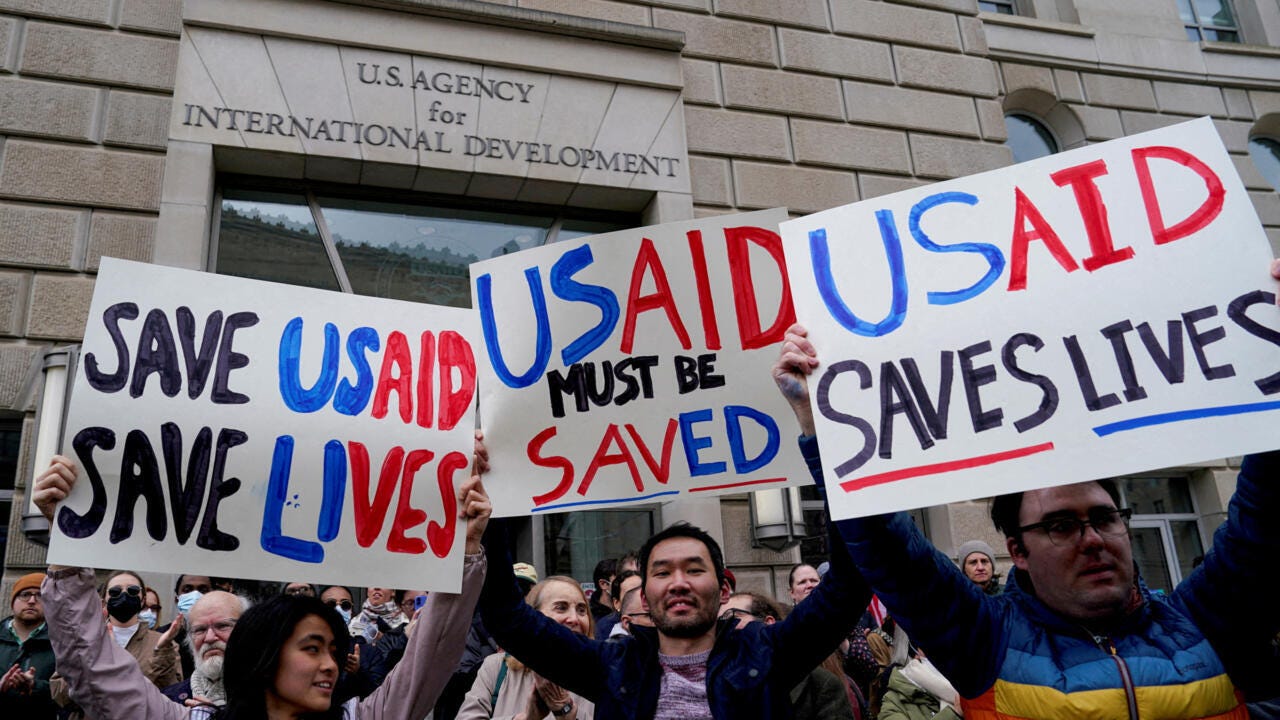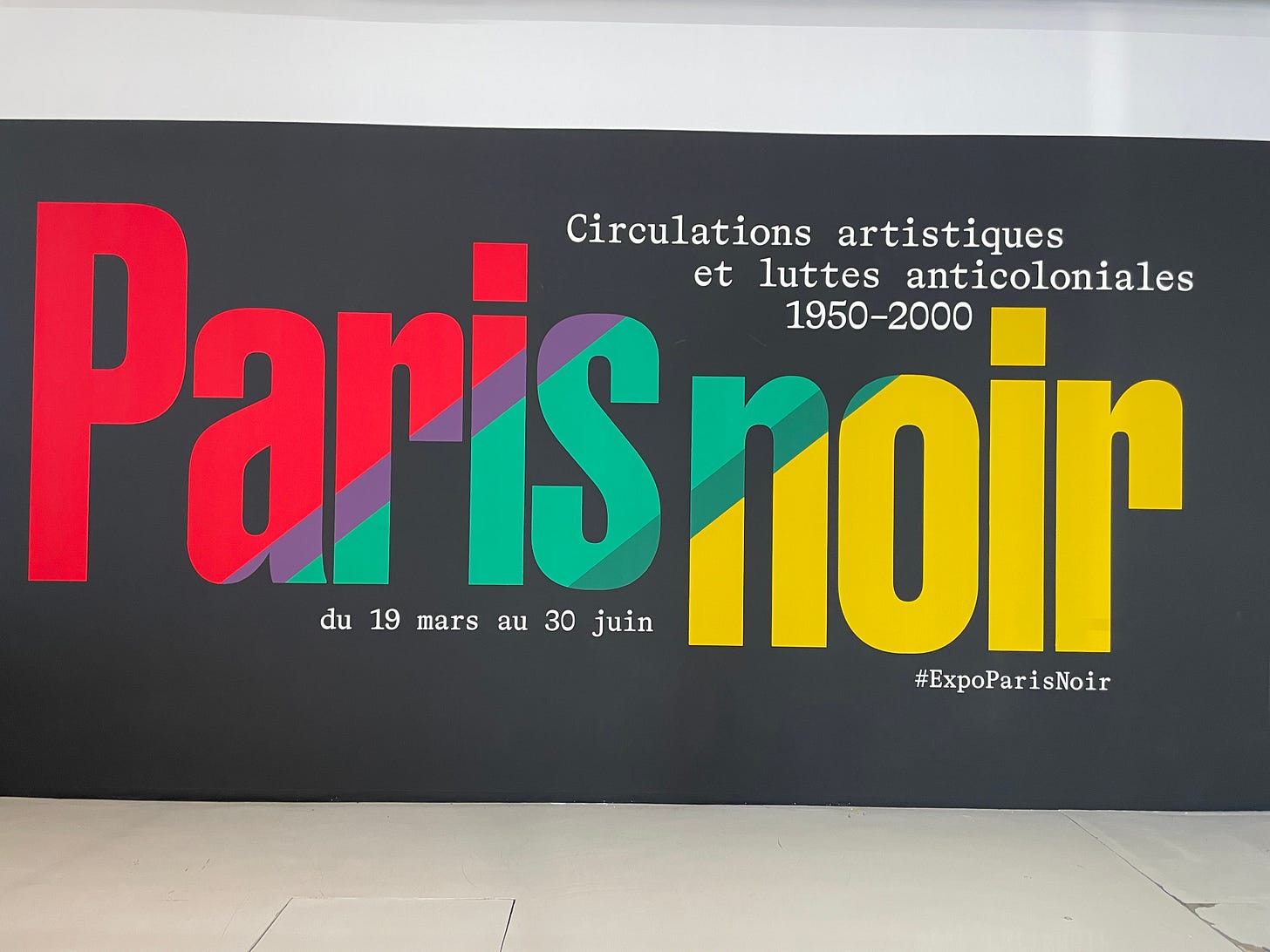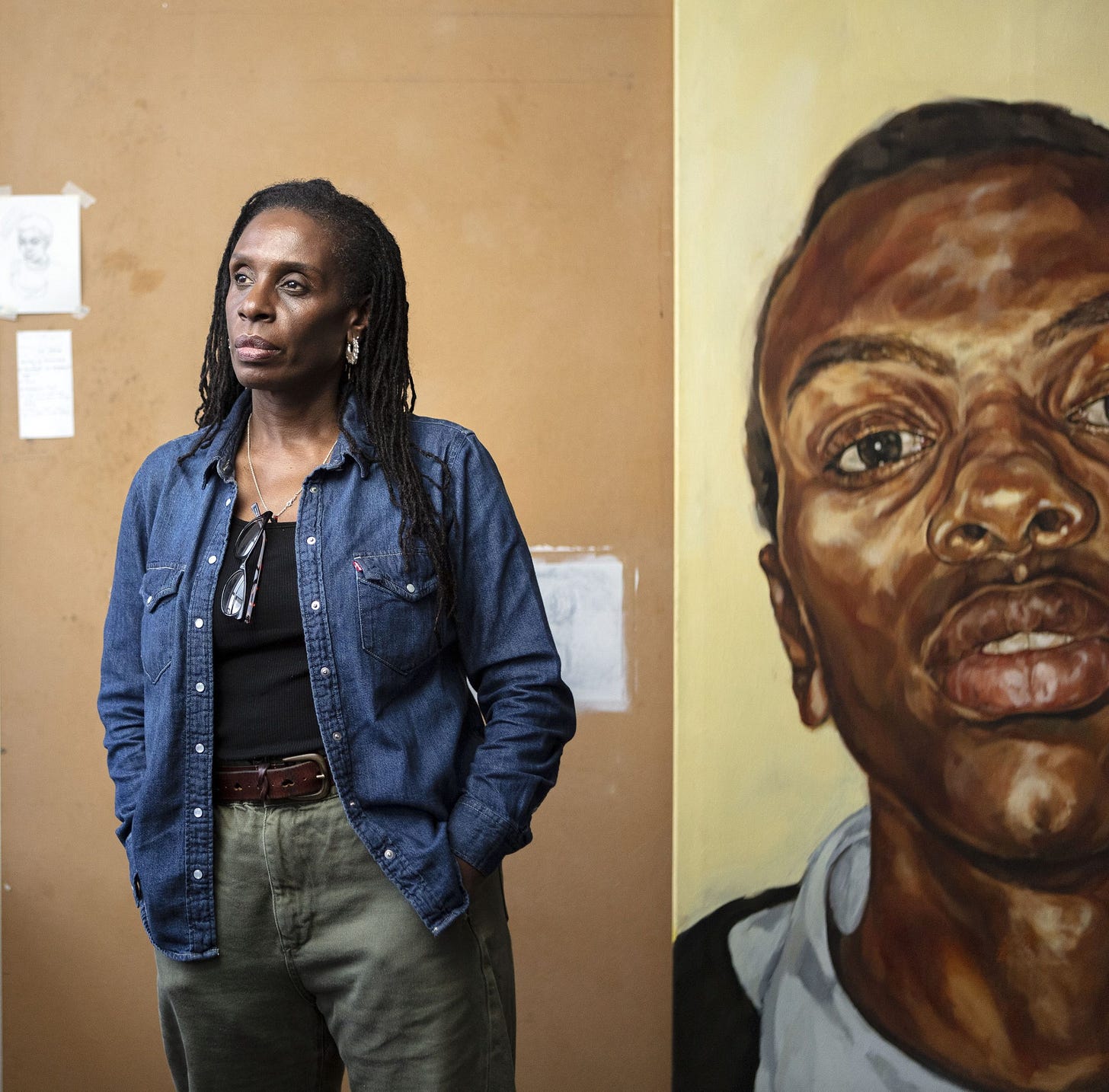A world without 'aid'? Inspiring alternatives
Little tour of stories, solutions, inspirations from Africa this week.
Dear readers,
As the world order known since 1945 vanishes, we can watch in silence, not watch at all, or think about alternative models.
If you’ve read this newsletter before, you probably guess what I’ll suggest to do.
That’s one of the reasons why, this week, Spotlight on Africa asks important questions around the future of aid, with an humanitarian worker, a columnist and an analyst, all from different parts of Africa.
As the United States and Europe decide to use their funds for arms and internal affairs, we wonder if the model of aid can survive, or whether it needs to change, and how.
Since the beginning of the year, the new President of the United States, Donald Trump, has decided to significantly reduce the country's multi-year aid contracts, with the aim of achieving approximately $60 billion in savings in overseas development and humanitarian assistance programs.
In addition, the United Kingdom has announced a week later a deep cut in its budget for emergency and development aid… to develop its defence system. And other European countries have suggested they might do the same.
These decisions are already affecting the system of emergency aid in many countries, including Sudan and Congo, as well as public health measures in countries like Kenya and South Africa, as I wrote in a previous post.
But this post essentially brings optimistic perspectives, on aid, but also on history, through art and more!
So, read on please.
Rethinking aid?
For Spotlight on Africa, I reached out to three experts, heavily involved in rethinking the future of aid.
First, I received Jeffrey Okoro, the executive director of the NGO CFK Africa in Kenya. He told me that since the decision of the US government to freeze US Agency for International Development (USAID) spending in January, Kenyans working in healthcare are directly affected.
The decision has already disrupted efforts to stop the spread of diseases like HIV and tuberculosis.
"A sizeable portion of the Kenyan government funding for health counselling comes from international organisations from foreign governments," Okoro told me from his office in Kenya.
Then I called Ivor Ichikowitz, who I interviewed in Johannesburg last year, the chairman of the philanthropic Ichikowitz Family Foundation, which focuses on growth and development on the African continent, who is South African. He works on global affairs and also follows closely the role of SA in the Ukraine / Russia war notably. To him, the decrease of aid and the rise of European investment, as discussed in South Africa on Thursday, can be good news. You’ll hear more from him in the podcast episode.
I also spoke with Patrick Gathara, a Kenyan columnist and senior editor at The New Humanitarian, a website covering conflicts and humanitarian issues. As he wrote, "the aid industry has always propped up imperial domination. Its implosion may be an opportunity to shape a new order." He will tell us how.
Spotlight on Africa: Is the future of aid at risk and ready for change?
Listen on our website from here: https://www.rfi.fr/en/podcasts/spotlight-on-africa/20250318-spotlight-on-africa-is-the-future-of-aid-at-risk-and-ready-for-change
Spotlight on Africa is produced by Radio France Internationale's English language service.
For more on the situation on the ground:
US grant cuts could affect two million worldwide, disrupt HIV aid in Kenya
South Africa faces HIV crisis as Trump’s aid freeze halts treatment and research
Sudan reels as US suspends aid amid ongoing war
Solutions and positive outcomes… Round up:
DRC conflict
Tshisekedi and Kagame meet in Qatar for crisis talks on eastern DRC
The face-to-face meeting between Felix Tshisekedi and Paul Kagame took place on Tuesday in Qatar, mediated by the emir, in an attempt to find a solution to the security crisis in eastern DRC.
Issued on: 19/03/2025
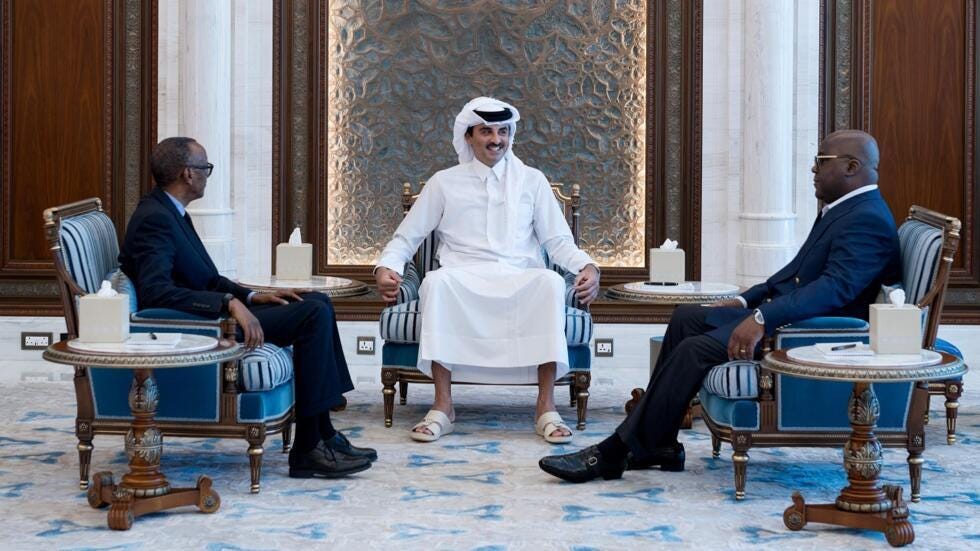
Kinshasa accuses its neighbour of supporting the M23 rebellion, which has seized large parts of the South and North Kivu provinces. These accusations are supported by several United Nations reports, but denied by Kigali.
Since then, various attempts have been made by regional organisations and mediators to revive dialogue between the two leaders. This has now been accomplished.
According to sources talking to RFI's Africa service, the meeting began at 4pm in Doha (1pm UTC) and lasted about 45 minutes in an atmosphere deemed "cordial," largely thanks to the involvement of the emir, who had already tried in January 2023 to organise a meeting between the two presidents. That meeting was cancelled at the last minute.
Tresor Kibangula of the Ebuteli Institute for Political Analysis told RFI that Western sanctions and pressure are beginning to weigh on Kagame, and that Tshisekedi has finally come around to the idea of negotiating with the M23, which he had previously rejected. That is because the balance of power on the ground has changed since the armed group conquered Goma and Bukavu, he said.
EU flags stronger partnership with South Africa with €4.7bn investment
European Commission President Ursula von der Leyen has announced a €4.7 billion investment package for South Africa, on her visit to the country for the EU-South Africa summit, with the country's President Ramaphosa welcoming consolidated cooperation.
Issued on: 13/03/2025
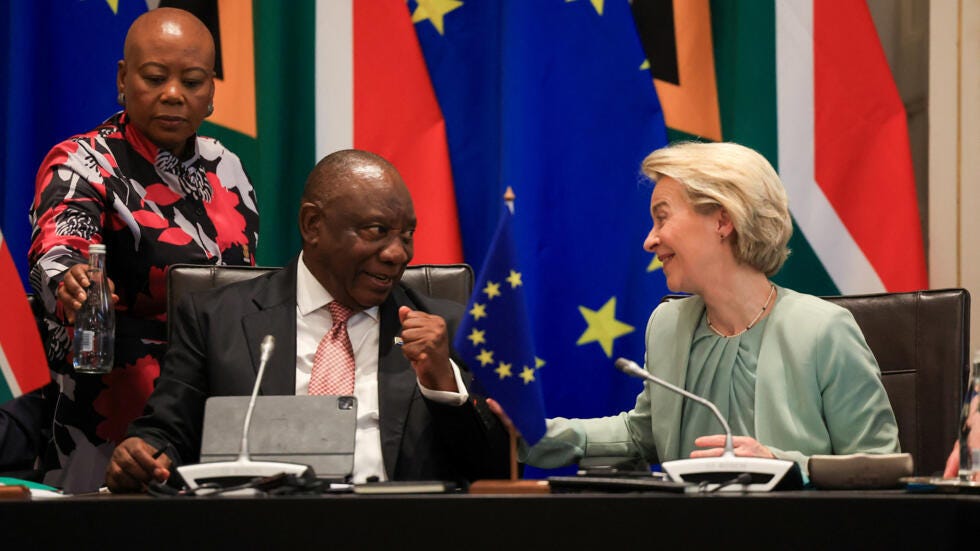
By: Melissa Chemam
Von der Leyen was in Cape Town on Thursday alongside other European leaders to take part in the eighth EU-South Africa summit.
The European Commission president said the Global Gateway investment package was intended to support a just energy transition, vaccine manufacturing and digital and physical connectivity.
The summit aims to enhance bilateral cooperation, including in the economy, trade and investment relations and security and defence. South Africa is the EU’s largest trading partner in sub-Saharan Africa, with €49 billion worth of trade in goods in 2023.
The bloc has also recently become South Africa’s top source of foreign direct investment – 53.7 percent of the total in 2022.
Inspiring events in Paris and London this month and continuing in the spring:
Paris Noir @ Centre Pompidou
I posted my first insight, in pictures, on my blog here. A longer article is to come this weekend.
New works by Jon One, Valérie John, Nathalie Leroy Fiévee, Jay Ramier, Shuck One
20th century artists include: Wifredo Lam, Beauford Delaney (a friend of Baldwin's), Ernest Breleur, Skunder Boghossian, Christian Lattier, Demas Nwoko...
Lots of them from Haiti, Martinique, Côte d'Ivoire... And a few Americans, of course, like Faith Ringgold.
From the creation of the magazine 'Présence Africaine' to that of 'Revue noire', Paris noir traces the presence and influence of black artists in France between the 1950s and 2000s.
It highlights one hundred and fifty artists, from Africa to the Americas via the Caribbean, whose works have rarely been shown in France.
Paris African Book fair 2025
A little tour at the fourth edition of the Paris African Book fair, last Saturday.
I met authors such as theCameroonian author Eugène Ebodé, presenting his latest book, 'Zam Zam'.
I’ll write more soon, especially on Frantz Fanon, as this year marks his centenary.
Noah Davis at Barbican
London's must-see exhibition of the moment.
A selection of pictures I took: https://melissa-on-the-road.blogspot.com/2025/03/noah-davis-at-barbican.html
Barbara Walker at Arnolfini
Barbara Walker is a British artist described by art historian Eddie Chambers as “one of the most talented, productive and committed artists of her generation.” Her first major survey exhibition is on show at Arnolfini, Bristol, this Spring 2025 (since 08 March - and until 25 May 2025 ).
Being Here charts the artist’s compelling figurative practice, from the 1990s to our days. British artist Barbara Walker was described as one of the most important British artists working today.
Fanon - The film
Out in April, more on the film soon
Thanks for reading, as always.
all my best wishes,
melissa



